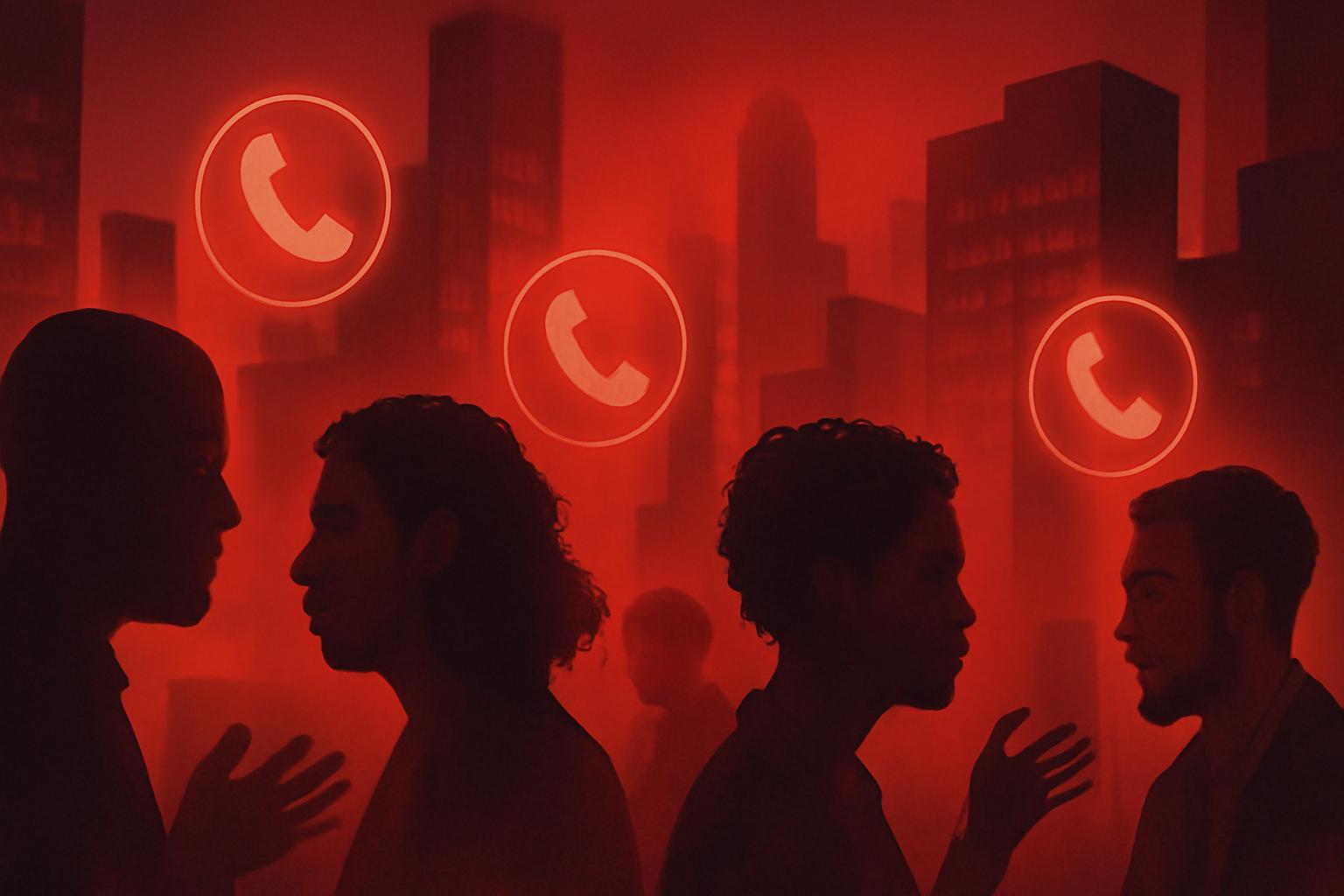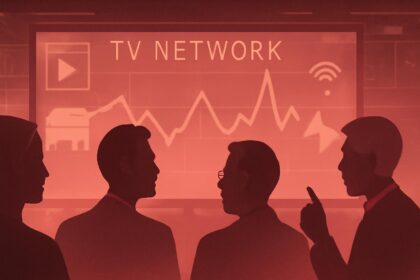The dispute over 1-800-GAMBLER highlights the complexities of managing a national support service amid growing demand driven by legalized gambling expansion. The hotline’s accessibility and operational continuity are critical for mitigating problem gambling risks. !-- wp:paragraph -->
- Opportunities: Enhanced national coordination could improve data analytics and targeted interventions for gambling addiction.
- Risks: Fragmentation of hotline management risks service disruption and reduced caller trust, potentially leaving vulnerable populations without support.
- Continued legal uncertainty may hamper funding and partnerships essential for sustainable operation.
- State and local councils’ cooperation is vital to maintain comprehensive coverage and data sharing.
FinOracleAI — Market View
The dispute over 1-800-GAMBLER highlights the complexities of managing a national support service amid growing demand driven by legalized gambling expansion. The hotline’s accessibility and operational continuity are critical for mitigating problem gambling risks. !-- wp:paragraph -->- Opportunities: Enhanced national coordination could improve data analytics and targeted interventions for gambling addiction.
- Risks: Fragmentation of hotline management risks service disruption and reduced caller trust, potentially leaving vulnerable populations without support.
- Continued legal uncertainty may hamper funding and partnerships essential for sustainable operation.
- State and local councils’ cooperation is vital to maintain comprehensive coverage and data sharing.
FinOracleAI — Market View
The dispute over 1-800-GAMBLER highlights the complexities of managing a national support service amid growing demand driven by legalized gambling expansion. The hotline’s accessibility and operational continuity are critical for mitigating problem gambling risks. !-- wp:paragraph -->- Opportunities: Enhanced national coordination could improve data analytics and targeted interventions for gambling addiction.
- Risks: Fragmentation of hotline management risks service disruption and reduced caller trust, potentially leaving vulnerable populations without support.
- Continued legal uncertainty may hamper funding and partnerships essential for sustainable operation.
- State and local councils’ cooperation is vital to maintain comprehensive coverage and data sharing.
Recent Court Decision
On September 29, 2025, the New Jersey Supreme Court denied NCPG’s request for an emergency stay, effectively allowing the hotline to revert to CCGNJ control. This marks a significant shift in the management of the nation’s primary gambling addiction support line. !-- wp:paragraph --> In the interim, NCPG announced it will revert to its former helpline number, 1-800-522-4700, which lacks the same level of national recognition. !-- wp:paragraph -->FinOracleAI — Market View
The dispute over 1-800-GAMBLER highlights the complexities of managing a national support service amid growing demand driven by legalized gambling expansion. The hotline’s accessibility and operational continuity are critical for mitigating problem gambling risks. !-- wp:paragraph -->- Opportunities: Enhanced national coordination could improve data analytics and targeted interventions for gambling addiction.
- Risks: Fragmentation of hotline management risks service disruption and reduced caller trust, potentially leaving vulnerable populations without support.
- Continued legal uncertainty may hamper funding and partnerships essential for sustainable operation.
- State and local councils’ cooperation is vital to maintain comprehensive coverage and data sharing.
“Our greatest fear is that people in crisis will pick up the phone, or send a text, and find no one on the other end,” said Jaime Costello, NCPG’s director of programs.
Support from Major Stakeholders
The NFL has been a major financial backer of NCPG, contributing over $12 million across six years. The league emphasized the importance of uninterrupted service, stating that 1-800-GAMBLER has become a “vitally important national resource” under NCPG stewardship. !-- wp:paragraph -->Recent Court Decision
On September 29, 2025, the New Jersey Supreme Court denied NCPG’s request for an emergency stay, effectively allowing the hotline to revert to CCGNJ control. This marks a significant shift in the management of the nation’s primary gambling addiction support line. !-- wp:paragraph --> In the interim, NCPG announced it will revert to its former helpline number, 1-800-522-4700, which lacks the same level of national recognition. !-- wp:paragraph -->FinOracleAI — Market View
The dispute over 1-800-GAMBLER highlights the complexities of managing a national support service amid growing demand driven by legalized gambling expansion. The hotline’s accessibility and operational continuity are critical for mitigating problem gambling risks. !-- wp:paragraph -->- Opportunities: Enhanced national coordination could improve data analytics and targeted interventions for gambling addiction.
- Risks: Fragmentation of hotline management risks service disruption and reduced caller trust, potentially leaving vulnerable populations without support.
- Continued legal uncertainty may hamper funding and partnerships essential for sustainable operation.
- State and local councils’ cooperation is vital to maintain comprehensive coverage and data sharing.
“Our greatest fear is that people in crisis will pick up the phone, or send a text, and find no one on the other end,” said Jaime Costello, NCPG’s director of programs.
Support from Major Stakeholders
The NFL has been a major financial backer of NCPG, contributing over $12 million across six years. The league emphasized the importance of uninterrupted service, stating that 1-800-GAMBLER has become a “vitally important national resource” under NCPG stewardship. !-- wp:paragraph -->Recent Court Decision
On September 29, 2025, the New Jersey Supreme Court denied NCPG’s request for an emergency stay, effectively allowing the hotline to revert to CCGNJ control. This marks a significant shift in the management of the nation’s primary gambling addiction support line. !-- wp:paragraph --> In the interim, NCPG announced it will revert to its former helpline number, 1-800-522-4700, which lacks the same level of national recognition. !-- wp:paragraph -->FinOracleAI — Market View
The dispute over 1-800-GAMBLER highlights the complexities of managing a national support service amid growing demand driven by legalized gambling expansion. The hotline’s accessibility and operational continuity are critical for mitigating problem gambling risks. !-- wp:paragraph -->- Opportunities: Enhanced national coordination could improve data analytics and targeted interventions for gambling addiction.
- Risks: Fragmentation of hotline management risks service disruption and reduced caller trust, potentially leaving vulnerable populations without support.
- Continued legal uncertainty may hamper funding and partnerships essential for sustainable operation.
- State and local councils’ cooperation is vital to maintain comprehensive coverage and data sharing.
“Our greatest fear is that people in crisis will pick up the phone, or send a text, and find no one on the other end,” said Jaime Costello, NCPG’s director of programs.
Support from Major Stakeholders
The NFL has been a major financial backer of NCPG, contributing over $12 million across six years. The league emphasized the importance of uninterrupted service, stating that 1-800-GAMBLER has become a “vitally important national resource” under NCPG stewardship. !-- wp:paragraph -->Recent Court Decision
On September 29, 2025, the New Jersey Supreme Court denied NCPG’s request for an emergency stay, effectively allowing the hotline to revert to CCGNJ control. This marks a significant shift in the management of the nation’s primary gambling addiction support line. !-- wp:paragraph --> In the interim, NCPG announced it will revert to its former helpline number, 1-800-522-4700, which lacks the same level of national recognition. !-- wp:paragraph -->FinOracleAI — Market View
The dispute over 1-800-GAMBLER highlights the complexities of managing a national support service amid growing demand driven by legalized gambling expansion. The hotline’s accessibility and operational continuity are critical for mitigating problem gambling risks. !-- wp:paragraph -->- Opportunities: Enhanced national coordination could improve data analytics and targeted interventions for gambling addiction.
- Risks: Fragmentation of hotline management risks service disruption and reduced caller trust, potentially leaving vulnerable populations without support.
- Continued legal uncertainty may hamper funding and partnerships essential for sustainable operation.
- State and local councils’ cooperation is vital to maintain comprehensive coverage and data sharing.
Data Collection and Operational Tensions
A significant point of contention relates to data collection. NCPG collects and analyzes call data to monitor gambling addiction trends, but some states using the hotline decline to share statistics with the national body. !-- wp:paragraph --> Luis Del Orbe, executive director of CCGNJ, accused NCPG of “weaponizing the number,” alleging that NCPG pressured local councils for data and threatened to block non-compliant states from the hotline. !-- wp:paragraph --> NCPG countered that it has extended offers of consultation, training, and financial support to state councils, but some declined or failed to meet participation requirements, leading to rerouting of calls. !-- wp:paragraph -->“Our greatest fear is that people in crisis will pick up the phone, or send a text, and find no one on the other end,” said Jaime Costello, NCPG’s director of programs.
Support from Major Stakeholders
The NFL has been a major financial backer of NCPG, contributing over $12 million across six years. The league emphasized the importance of uninterrupted service, stating that 1-800-GAMBLER has become a “vitally important national resource” under NCPG stewardship. !-- wp:paragraph -->Recent Court Decision
On September 29, 2025, the New Jersey Supreme Court denied NCPG’s request for an emergency stay, effectively allowing the hotline to revert to CCGNJ control. This marks a significant shift in the management of the nation’s primary gambling addiction support line. !-- wp:paragraph --> In the interim, NCPG announced it will revert to its former helpline number, 1-800-522-4700, which lacks the same level of national recognition. !-- wp:paragraph -->FinOracleAI — Market View
The dispute over 1-800-GAMBLER highlights the complexities of managing a national support service amid growing demand driven by legalized gambling expansion. The hotline’s accessibility and operational continuity are critical for mitigating problem gambling risks. !-- wp:paragraph -->- Opportunities: Enhanced national coordination could improve data analytics and targeted interventions for gambling addiction.
- Risks: Fragmentation of hotline management risks service disruption and reduced caller trust, potentially leaving vulnerable populations without support.
- Continued legal uncertainty may hamper funding and partnerships essential for sustainable operation.
- State and local councils’ cooperation is vital to maintain comprehensive coverage and data sharing.
“Thousands of individuals and families could suddenly find themselves without access to the only national lifeline for problem gambling,” stated Amanda Szmuc, attorney for NCPG.
Despite this, the New Jersey group maintains that it is prepared to manage the hotline, utilizing a 24-hour call center in Louisiana for after-hours calls, the same center used by multiple states connected to the 1-800-GAMBLER network. !-- wp:paragraph -->Data Collection and Operational Tensions
A significant point of contention relates to data collection. NCPG collects and analyzes call data to monitor gambling addiction trends, but some states using the hotline decline to share statistics with the national body. !-- wp:paragraph --> Luis Del Orbe, executive director of CCGNJ, accused NCPG of “weaponizing the number,” alleging that NCPG pressured local councils for data and threatened to block non-compliant states from the hotline. !-- wp:paragraph --> NCPG countered that it has extended offers of consultation, training, and financial support to state councils, but some declined or failed to meet participation requirements, leading to rerouting of calls. !-- wp:paragraph -->“Our greatest fear is that people in crisis will pick up the phone, or send a text, and find no one on the other end,” said Jaime Costello, NCPG’s director of programs.
Support from Major Stakeholders
The NFL has been a major financial backer of NCPG, contributing over $12 million across six years. The league emphasized the importance of uninterrupted service, stating that 1-800-GAMBLER has become a “vitally important national resource” under NCPG stewardship. !-- wp:paragraph -->Recent Court Decision
On September 29, 2025, the New Jersey Supreme Court denied NCPG’s request for an emergency stay, effectively allowing the hotline to revert to CCGNJ control. This marks a significant shift in the management of the nation’s primary gambling addiction support line. !-- wp:paragraph --> In the interim, NCPG announced it will revert to its former helpline number, 1-800-522-4700, which lacks the same level of national recognition. !-- wp:paragraph -->FinOracleAI — Market View
The dispute over 1-800-GAMBLER highlights the complexities of managing a national support service amid growing demand driven by legalized gambling expansion. The hotline’s accessibility and operational continuity are critical for mitigating problem gambling risks. !-- wp:paragraph -->- Opportunities: Enhanced national coordination could improve data analytics and targeted interventions for gambling addiction.
- Risks: Fragmentation of hotline management risks service disruption and reduced caller trust, potentially leaving vulnerable populations without support.
- Continued legal uncertainty may hamper funding and partnerships essential for sustainable operation.
- State and local councils’ cooperation is vital to maintain comprehensive coverage and data sharing.
“Thousands of individuals and families could suddenly find themselves without access to the only national lifeline for problem gambling,” stated Amanda Szmuc, attorney for NCPG.
Despite this, the New Jersey group maintains that it is prepared to manage the hotline, utilizing a 24-hour call center in Louisiana for after-hours calls, the same center used by multiple states connected to the 1-800-GAMBLER network. !-- wp:paragraph -->Data Collection and Operational Tensions
A significant point of contention relates to data collection. NCPG collects and analyzes call data to monitor gambling addiction trends, but some states using the hotline decline to share statistics with the national body. !-- wp:paragraph --> Luis Del Orbe, executive director of CCGNJ, accused NCPG of “weaponizing the number,” alleging that NCPG pressured local councils for data and threatened to block non-compliant states from the hotline. !-- wp:paragraph --> NCPG countered that it has extended offers of consultation, training, and financial support to state councils, but some declined or failed to meet participation requirements, leading to rerouting of calls. !-- wp:paragraph -->“Our greatest fear is that people in crisis will pick up the phone, or send a text, and find no one on the other end,” said Jaime Costello, NCPG’s director of programs.
Support from Major Stakeholders
The NFL has been a major financial backer of NCPG, contributing over $12 million across six years. The league emphasized the importance of uninterrupted service, stating that 1-800-GAMBLER has become a “vitally important national resource” under NCPG stewardship. !-- wp:paragraph -->Recent Court Decision
On September 29, 2025, the New Jersey Supreme Court denied NCPG’s request for an emergency stay, effectively allowing the hotline to revert to CCGNJ control. This marks a significant shift in the management of the nation’s primary gambling addiction support line. !-- wp:paragraph --> In the interim, NCPG announced it will revert to its former helpline number, 1-800-522-4700, which lacks the same level of national recognition. !-- wp:paragraph -->FinOracleAI — Market View
The dispute over 1-800-GAMBLER highlights the complexities of managing a national support service amid growing demand driven by legalized gambling expansion. The hotline’s accessibility and operational continuity are critical for mitigating problem gambling risks. !-- wp:paragraph -->- Opportunities: Enhanced national coordination could improve data analytics and targeted interventions for gambling addiction.
- Risks: Fragmentation of hotline management risks service disruption and reduced caller trust, potentially leaving vulnerable populations without support.
- Continued legal uncertainty may hamper funding and partnerships essential for sustainable operation.
- State and local councils’ cooperation is vital to maintain comprehensive coverage and data sharing.
Lease Dispute and Legal Actions
The lease agreement between NCPG and CCGNJ expired recently, triggering a standoff. The national council exercised its right to renew the lease for five more years, but the New Jersey group refused to continue the arrangement, asserting ownership over the number and related assets such as 800gambler.org. !-- wp:paragraph --> In response, NCPG filed for an emergency stay to prevent the NJ council from resuming control, citing concerns that the local group lacks sufficient resources to operate the hotline 24/7 effectively. !-- wp:paragraph -->“Thousands of individuals and families could suddenly find themselves without access to the only national lifeline for problem gambling,” stated Amanda Szmuc, attorney for NCPG.
Despite this, the New Jersey group maintains that it is prepared to manage the hotline, utilizing a 24-hour call center in Louisiana for after-hours calls, the same center used by multiple states connected to the 1-800-GAMBLER network. !-- wp:paragraph -->Data Collection and Operational Tensions
A significant point of contention relates to data collection. NCPG collects and analyzes call data to monitor gambling addiction trends, but some states using the hotline decline to share statistics with the national body. !-- wp:paragraph --> Luis Del Orbe, executive director of CCGNJ, accused NCPG of “weaponizing the number,” alleging that NCPG pressured local councils for data and threatened to block non-compliant states from the hotline. !-- wp:paragraph --> NCPG countered that it has extended offers of consultation, training, and financial support to state councils, but some declined or failed to meet participation requirements, leading to rerouting of calls. !-- wp:paragraph -->“Our greatest fear is that people in crisis will pick up the phone, or send a text, and find no one on the other end,” said Jaime Costello, NCPG’s director of programs.
Support from Major Stakeholders
The NFL has been a major financial backer of NCPG, contributing over $12 million across six years. The league emphasized the importance of uninterrupted service, stating that 1-800-GAMBLER has become a “vitally important national resource” under NCPG stewardship. !-- wp:paragraph -->Recent Court Decision
On September 29, 2025, the New Jersey Supreme Court denied NCPG’s request for an emergency stay, effectively allowing the hotline to revert to CCGNJ control. This marks a significant shift in the management of the nation’s primary gambling addiction support line. !-- wp:paragraph --> In the interim, NCPG announced it will revert to its former helpline number, 1-800-522-4700, which lacks the same level of national recognition. !-- wp:paragraph -->FinOracleAI — Market View
The dispute over 1-800-GAMBLER highlights the complexities of managing a national support service amid growing demand driven by legalized gambling expansion. The hotline’s accessibility and operational continuity are critical for mitigating problem gambling risks. !-- wp:paragraph -->- Opportunities: Enhanced national coordination could improve data analytics and targeted interventions for gambling addiction.
- Risks: Fragmentation of hotline management risks service disruption and reduced caller trust, potentially leaving vulnerable populations without support.
- Continued legal uncertainty may hamper funding and partnerships essential for sustainable operation.
- State and local councils’ cooperation is vital to maintain comprehensive coverage and data sharing.
Lease Dispute and Legal Actions
The lease agreement between NCPG and CCGNJ expired recently, triggering a standoff. The national council exercised its right to renew the lease for five more years, but the New Jersey group refused to continue the arrangement, asserting ownership over the number and related assets such as 800gambler.org. !-- wp:paragraph --> In response, NCPG filed for an emergency stay to prevent the NJ council from resuming control, citing concerns that the local group lacks sufficient resources to operate the hotline 24/7 effectively. !-- wp:paragraph -->“Thousands of individuals and families could suddenly find themselves without access to the only national lifeline for problem gambling,” stated Amanda Szmuc, attorney for NCPG.
Despite this, the New Jersey group maintains that it is prepared to manage the hotline, utilizing a 24-hour call center in Louisiana for after-hours calls, the same center used by multiple states connected to the 1-800-GAMBLER network. !-- wp:paragraph -->Data Collection and Operational Tensions
A significant point of contention relates to data collection. NCPG collects and analyzes call data to monitor gambling addiction trends, but some states using the hotline decline to share statistics with the national body. !-- wp:paragraph --> Luis Del Orbe, executive director of CCGNJ, accused NCPG of “weaponizing the number,” alleging that NCPG pressured local councils for data and threatened to block non-compliant states from the hotline. !-- wp:paragraph --> NCPG countered that it has extended offers of consultation, training, and financial support to state councils, but some declined or failed to meet participation requirements, leading to rerouting of calls. !-- wp:paragraph -->“Our greatest fear is that people in crisis will pick up the phone, or send a text, and find no one on the other end,” said Jaime Costello, NCPG’s director of programs.
Support from Major Stakeholders
The NFL has been a major financial backer of NCPG, contributing over $12 million across six years. The league emphasized the importance of uninterrupted service, stating that 1-800-GAMBLER has become a “vitally important national resource” under NCPG stewardship. !-- wp:paragraph -->Recent Court Decision
On September 29, 2025, the New Jersey Supreme Court denied NCPG’s request for an emergency stay, effectively allowing the hotline to revert to CCGNJ control. This marks a significant shift in the management of the nation’s primary gambling addiction support line. !-- wp:paragraph --> In the interim, NCPG announced it will revert to its former helpline number, 1-800-522-4700, which lacks the same level of national recognition. !-- wp:paragraph -->FinOracleAI — Market View
The dispute over 1-800-GAMBLER highlights the complexities of managing a national support service amid growing demand driven by legalized gambling expansion. The hotline’s accessibility and operational continuity are critical for mitigating problem gambling risks. !-- wp:paragraph -->- Opportunities: Enhanced national coordination could improve data analytics and targeted interventions for gambling addiction.
- Risks: Fragmentation of hotline management risks service disruption and reduced caller trust, potentially leaving vulnerable populations without support.
- Continued legal uncertainty may hamper funding and partnerships essential for sustainable operation.
- State and local councils’ cooperation is vital to maintain comprehensive coverage and data sharing.
Background and Usage Growth
Following NCPG’s takeover, call volume to the hotline increased by 34%, while media mentions surged over 5,000%. Today, approximately one-third of Americans recognize 1-800-GAMBLER as a national resource for problem gambling support. !-- wp:paragraph --> The hotline serves as a vital connection point, providing infrastructure and support for callers in 10 states and acting as a referral hub for numerous other jurisdictions. !-- wp:paragraph -->Lease Dispute and Legal Actions
The lease agreement between NCPG and CCGNJ expired recently, triggering a standoff. The national council exercised its right to renew the lease for five more years, but the New Jersey group refused to continue the arrangement, asserting ownership over the number and related assets such as 800gambler.org. !-- wp:paragraph --> In response, NCPG filed for an emergency stay to prevent the NJ council from resuming control, citing concerns that the local group lacks sufficient resources to operate the hotline 24/7 effectively. !-- wp:paragraph -->“Thousands of individuals and families could suddenly find themselves without access to the only national lifeline for problem gambling,” stated Amanda Szmuc, attorney for NCPG.
Despite this, the New Jersey group maintains that it is prepared to manage the hotline, utilizing a 24-hour call center in Louisiana for after-hours calls, the same center used by multiple states connected to the 1-800-GAMBLER network. !-- wp:paragraph -->Data Collection and Operational Tensions
A significant point of contention relates to data collection. NCPG collects and analyzes call data to monitor gambling addiction trends, but some states using the hotline decline to share statistics with the national body. !-- wp:paragraph --> Luis Del Orbe, executive director of CCGNJ, accused NCPG of “weaponizing the number,” alleging that NCPG pressured local councils for data and threatened to block non-compliant states from the hotline. !-- wp:paragraph --> NCPG countered that it has extended offers of consultation, training, and financial support to state councils, but some declined or failed to meet participation requirements, leading to rerouting of calls. !-- wp:paragraph -->“Our greatest fear is that people in crisis will pick up the phone, or send a text, and find no one on the other end,” said Jaime Costello, NCPG’s director of programs.
Support from Major Stakeholders
The NFL has been a major financial backer of NCPG, contributing over $12 million across six years. The league emphasized the importance of uninterrupted service, stating that 1-800-GAMBLER has become a “vitally important national resource” under NCPG stewardship. !-- wp:paragraph -->Recent Court Decision
On September 29, 2025, the New Jersey Supreme Court denied NCPG’s request for an emergency stay, effectively allowing the hotline to revert to CCGNJ control. This marks a significant shift in the management of the nation’s primary gambling addiction support line. !-- wp:paragraph --> In the interim, NCPG announced it will revert to its former helpline number, 1-800-522-4700, which lacks the same level of national recognition. !-- wp:paragraph -->FinOracleAI — Market View
The dispute over 1-800-GAMBLER highlights the complexities of managing a national support service amid growing demand driven by legalized gambling expansion. The hotline’s accessibility and operational continuity are critical for mitigating problem gambling risks. !-- wp:paragraph -->- Opportunities: Enhanced national coordination could improve data analytics and targeted interventions for gambling addiction.
- Risks: Fragmentation of hotline management risks service disruption and reduced caller trust, potentially leaving vulnerable populations without support.
- Continued legal uncertainty may hamper funding and partnerships essential for sustainable operation.
- State and local councils’ cooperation is vital to maintain comprehensive coverage and data sharing.
Background and Usage Growth
Following NCPG’s takeover, call volume to the hotline increased by 34%, while media mentions surged over 5,000%. Today, approximately one-third of Americans recognize 1-800-GAMBLER as a national resource for problem gambling support. !-- wp:paragraph --> The hotline serves as a vital connection point, providing infrastructure and support for callers in 10 states and acting as a referral hub for numerous other jurisdictions. !-- wp:paragraph -->Lease Dispute and Legal Actions
The lease agreement between NCPG and CCGNJ expired recently, triggering a standoff. The national council exercised its right to renew the lease for five more years, but the New Jersey group refused to continue the arrangement, asserting ownership over the number and related assets such as 800gambler.org. !-- wp:paragraph --> In response, NCPG filed for an emergency stay to prevent the NJ council from resuming control, citing concerns that the local group lacks sufficient resources to operate the hotline 24/7 effectively. !-- wp:paragraph -->“Thousands of individuals and families could suddenly find themselves without access to the only national lifeline for problem gambling,” stated Amanda Szmuc, attorney for NCPG.
Despite this, the New Jersey group maintains that it is prepared to manage the hotline, utilizing a 24-hour call center in Louisiana for after-hours calls, the same center used by multiple states connected to the 1-800-GAMBLER network. !-- wp:paragraph -->Data Collection and Operational Tensions
A significant point of contention relates to data collection. NCPG collects and analyzes call data to monitor gambling addiction trends, but some states using the hotline decline to share statistics with the national body. !-- wp:paragraph --> Luis Del Orbe, executive director of CCGNJ, accused NCPG of “weaponizing the number,” alleging that NCPG pressured local councils for data and threatened to block non-compliant states from the hotline. !-- wp:paragraph --> NCPG countered that it has extended offers of consultation, training, and financial support to state councils, but some declined or failed to meet participation requirements, leading to rerouting of calls. !-- wp:paragraph -->“Our greatest fear is that people in crisis will pick up the phone, or send a text, and find no one on the other end,” said Jaime Costello, NCPG’s director of programs.
Support from Major Stakeholders
The NFL has been a major financial backer of NCPG, contributing over $12 million across six years. The league emphasized the importance of uninterrupted service, stating that 1-800-GAMBLER has become a “vitally important national resource” under NCPG stewardship. !-- wp:paragraph -->Recent Court Decision
On September 29, 2025, the New Jersey Supreme Court denied NCPG’s request for an emergency stay, effectively allowing the hotline to revert to CCGNJ control. This marks a significant shift in the management of the nation’s primary gambling addiction support line. !-- wp:paragraph --> In the interim, NCPG announced it will revert to its former helpline number, 1-800-522-4700, which lacks the same level of national recognition. !-- wp:paragraph -->FinOracleAI — Market View
The dispute over 1-800-GAMBLER highlights the complexities of managing a national support service amid growing demand driven by legalized gambling expansion. The hotline’s accessibility and operational continuity are critical for mitigating problem gambling risks. !-- wp:paragraph -->- Opportunities: Enhanced national coordination could improve data analytics and targeted interventions for gambling addiction.
- Risks: Fragmentation of hotline management risks service disruption and reduced caller trust, potentially leaving vulnerable populations without support.
- Continued legal uncertainty may hamper funding and partnerships essential for sustainable operation.
- State and local councils’ cooperation is vital to maintain comprehensive coverage and data sharing.
Growing Legal Battle Over 1-800-GAMBLER Hotline
The rapid expansion of legal sports betting across the United States has heightened concerns about problem gambling, spotlighting the critical role of the 1-800-GAMBLER hotline. This number is widely recognized as the primary national resource for individuals seeking help with gambling addiction. !-- wp:paragraph --> Since 2022, the National Council on Problem Gambling (NCPG) has operated the hotline under a leasing agreement with the Council on Compulsive Gambling of New Jersey (CCGNJ), which originally owned and managed the number since 1983. However, this arrangement has recently sparked a contentious legal dispute. !-- wp:paragraph -->Background and Usage Growth
Following NCPG’s takeover, call volume to the hotline increased by 34%, while media mentions surged over 5,000%. Today, approximately one-third of Americans recognize 1-800-GAMBLER as a national resource for problem gambling support. !-- wp:paragraph --> The hotline serves as a vital connection point, providing infrastructure and support for callers in 10 states and acting as a referral hub for numerous other jurisdictions. !-- wp:paragraph -->Lease Dispute and Legal Actions
The lease agreement between NCPG and CCGNJ expired recently, triggering a standoff. The national council exercised its right to renew the lease for five more years, but the New Jersey group refused to continue the arrangement, asserting ownership over the number and related assets such as 800gambler.org. !-- wp:paragraph --> In response, NCPG filed for an emergency stay to prevent the NJ council from resuming control, citing concerns that the local group lacks sufficient resources to operate the hotline 24/7 effectively. !-- wp:paragraph -->“Thousands of individuals and families could suddenly find themselves without access to the only national lifeline for problem gambling,” stated Amanda Szmuc, attorney for NCPG.
Despite this, the New Jersey group maintains that it is prepared to manage the hotline, utilizing a 24-hour call center in Louisiana for after-hours calls, the same center used by multiple states connected to the 1-800-GAMBLER network. !-- wp:paragraph -->Data Collection and Operational Tensions
A significant point of contention relates to data collection. NCPG collects and analyzes call data to monitor gambling addiction trends, but some states using the hotline decline to share statistics with the national body. !-- wp:paragraph --> Luis Del Orbe, executive director of CCGNJ, accused NCPG of “weaponizing the number,” alleging that NCPG pressured local councils for data and threatened to block non-compliant states from the hotline. !-- wp:paragraph --> NCPG countered that it has extended offers of consultation, training, and financial support to state councils, but some declined or failed to meet participation requirements, leading to rerouting of calls. !-- wp:paragraph -->“Our greatest fear is that people in crisis will pick up the phone, or send a text, and find no one on the other end,” said Jaime Costello, NCPG’s director of programs.
Support from Major Stakeholders
The NFL has been a major financial backer of NCPG, contributing over $12 million across six years. The league emphasized the importance of uninterrupted service, stating that 1-800-GAMBLER has become a “vitally important national resource” under NCPG stewardship. !-- wp:paragraph -->Recent Court Decision
On September 29, 2025, the New Jersey Supreme Court denied NCPG’s request for an emergency stay, effectively allowing the hotline to revert to CCGNJ control. This marks a significant shift in the management of the nation’s primary gambling addiction support line. !-- wp:paragraph --> In the interim, NCPG announced it will revert to its former helpline number, 1-800-522-4700, which lacks the same level of national recognition. !-- wp:paragraph -->FinOracleAI — Market View
The dispute over 1-800-GAMBLER highlights the complexities of managing a national support service amid growing demand driven by legalized gambling expansion. The hotline’s accessibility and operational continuity are critical for mitigating problem gambling risks. !-- wp:paragraph -->- Opportunities: Enhanced national coordination could improve data analytics and targeted interventions for gambling addiction.
- Risks: Fragmentation of hotline management risks service disruption and reduced caller trust, potentially leaving vulnerable populations without support.
- Continued legal uncertainty may hamper funding and partnerships essential for sustainable operation.
- State and local councils’ cooperation is vital to maintain comprehensive coverage and data sharing.













